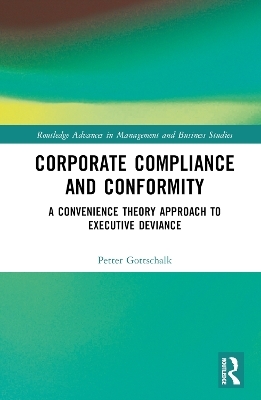
Corporate Compliance and Conformity
Routledge (Verlag)
978-1-032-45908-0 (ISBN)
Rather than focusing on the regulatory formalities and staged procedures of compliance and audits, the book emphasizes the organizational challenges involved in compliance work when trusted corporate officials exhibit deviant behavior, refining, and advancing knowledge in this field by reference to contemporary international case studies and associated original evaluative research. The themes and cases covered are carefully selected to provide the reader with an insight into professional conduct and procedural practice – the organization of corporate compliance success, failure, and corruption – with the theory of convenience placed at the fore. It is the bottom-up approach by application of convenience theory that makes the proposed book unique compared to other books on corporate compliance.
This book is a valuable resource for scholars and upper-level students researching and studying in the areas of business administration, organizational behavior, corporate and white-collar crime, as well as business ethics and auditing.
Petter Gottschalk is Professor in the Department of Leadership and Organizational Behaviour at BI Norwegian Business School in Oslo, Norway. Before joining academics, he held several chief executive officer positions in business enterprises. He received his education in Germany (Technical University of Berlin), United States (Dartmouth College and Massachusetts Institute of Technology), and United Kingdom (Henley Management College). Dr. Gottschalk has published extensively his research on knowledge management, police investigations, fraud examinations, white-collar crime, convenience theory, and corporate investigations.
Introduction
References
PART I CRIME CONVENIENCE
Chapter 1 Compliance-Conformity-Convenience
Compliance in Corporate Governance
Remaking Capitalism for Social Acceptance
Responses to Normative Pressures
Research Perspectives on Compliance
Legalistic and Formalistic Approaches
Compliance Audits and Risk Assessment
Fraud Examinations of Compliance Failures
Maturity Model for Corporate Compliance
References
Chapter 2 Profiling White-Collar Offenders
Structural Convenience Model
Profiling Motive Convenience
Profiling Opportunity Convenience
Profiling Willingness Convenience
Visual Offender Profile Representation
References
Chapter 3 Convenient Corruption in Sports
Characteristics of Sport Corruption
Convenience in Sport Corruption
Corrupt Sport Nations
Corrupt Sport Coaches
Corrupt Biathlon President
Bribers and Bribed Officials
References
Chapter 4 Economic Crime in the Fishing Industry
Structural Model of Convenience
Economic Motive Convenience
Business Opportunity Convenience
Personal Willingness Convenience
IUU Fishing Convenience Propositions
Electronic Reporting for Compliance
References
Chapter 5 Covid-19 Creative Non-Compliance
Variety of Covid-19 Frauds
Covid-19 Fraud Convenience
Convenient Motive during Pandemic
Convenient Opportunity during Pandemic
Convenient Willingness during Pandemic
Magnitude of Crime during Pandemic
References
Chapter 6 Stigma or Competition Effect
Corporate Crises and Scandals
Effects on Non-Accused Firms
Fraud Investigation Reports
Peer Product Market Overlap
References
PART II COMPLIANCE CONTROL
Chapter 7 Corporate Social License to Operate
Characteristics of the Social License
Danish Bestseller in Myanmar
Social Housing by Obos in Norway
Icelandic Samherji Fishing in Namibia
Shortcomings of Legal Perspectives
References
Chapter 8 Bottom-Up Corporate Control
Chief Executive Offenders
Offender Crime Convenience
Offender Status Convenience
Resource Access Convenience
Organization Deterioration Convenience
Role Agency Convenience
Rule Complexity Convenience
Outside-In Approaches
References
Chapter 9 Auditors Disturbing Crime Convenience
Crime Prevention and Detection
Convenience Disturbance Themes
Disturbing Motive Convenience
Disturbing Opportunity Convenience
Disturbing Willingness Convenience
Auditing Practice Disturbance Gap
References
Chapter 10 Theater of the Courtroom
Member of Parliament and Mansion Architect
Storytelling in the Courtroom Theater
Embezzlement by Member of Parliament
Corruption by Summer Mansion Architect
Language Games in Prosecution and Defense
Questioning by Prosecution and Defense
References
Chapter 11 Corporate Internal Investigations
Australian, Dutch, and UK Research
Secrecy of Investigation Reports
Review of 163 Investigation Reports
Outcomes for Crime Suspects
References
Appendix A Characteristics at Suspicion
Appendix B Characteristics of Suspects in Norway
Appendix C Characteristics of Other Suspects
Appendix D Comparison of Outcomes for Suspects
Chapter 12 Characteristics of Corporate Investigators
Alternative Policing of Economic Crime
Australia: Professional Image
Canada: Role of Private Sector
The Netherlands: Professional Roles
Norway: Outcome of Investigations
The United Kingdom: Second Careers
Evaluation of Investigation Reports
References
Conclusion
| Erscheinungsdatum | 20.02.2023 |
|---|---|
| Reihe/Serie | Routledge Advances in Management and Business Studies |
| Zusatzinfo | 4 Tables, black and white; 13 Line drawings, black and white; 13 Illustrations, black and white |
| Verlagsort | London |
| Sprache | englisch |
| Maße | 156 x 234 mm |
| Gewicht | 610 g |
| Themenwelt | Recht / Steuern ► EU / Internationales Recht |
| Recht / Steuern ► Strafrecht ► Kriminologie | |
| Wirtschaft ► Betriebswirtschaft / Management ► Marketing / Vertrieb | |
| Wirtschaft ► Betriebswirtschaft / Management ► Unternehmensführung / Management | |
| Wirtschaft ► Volkswirtschaftslehre | |
| ISBN-10 | 1-032-45908-5 / 1032459085 |
| ISBN-13 | 978-1-032-45908-0 / 9781032459080 |
| Zustand | Neuware |
| Haben Sie eine Frage zum Produkt? |
aus dem Bereich


